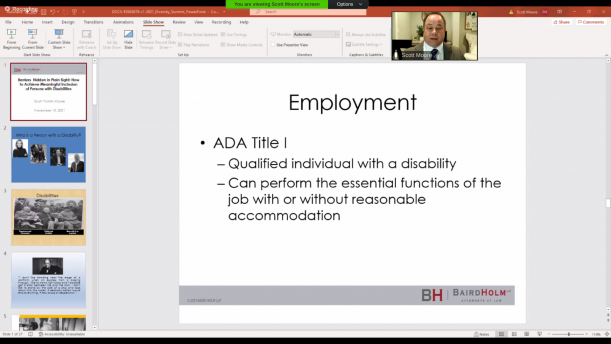OBA, NePA Collaborate to Discuss Diversity, Inclusion

Omaha attorney Scott Moore, upper right in the Zoom window, discusses how workplace accommodations have gotten better for employees with disabilities, but notes that stigma and discrimination persist, during the OBA/NePA Diversity & Inclusion seminar on Nov. 10, 2021. (Daily Record)
When he was a college freshman, Omaha attorney Scott Moore was in a car accident that would fundamentally change his life.
A cross country runner at Kearney State — now the University of Nebraska at Kearney — Moore was in great shape when he woke up the morning of Nov. 21, 1987. That would be the last morning he woke up without a disability.
“I was drinking with some friends of mine and we got into a car,” Moore said. “We were out driving, and the driver was drunk, and we got in an accident and the car rolled 10 times. I flew out the back window and was laying there in a farm field, somewhere in the middle of Nebraska, around Kearney, with a broken back, five broken ribs, a ruptured spleen, contusion over my eye, and many other bumps and bruises. As a result of that accident, my spinal cord was severed, and I became a paraplegic.”
Moore, a partner at Baird Holm, shared his story as part of the Omaha Bar Association and Nebraska Paralegal Association’s third annual Diversity & Inclusion Seminar earlier this month.
The 4-hour continuing legal education event included several speakers who all have been affected by disability personally, work as advocates in the field or represent those who have been discriminated against due to a disability.
During his presentation, “Barriers Hidden in Plain Sight: How to Achieve Meaningful Inclusion of Persons with Disabilities,” Moore related his own experiences as a person with a disability and how legislation like the Americans with Disabilities Act have helped the disabled community, while acknowledging there is still a long way to go to achieve full equity and inclusion.
“My personal experience, both not having a disability and then having a disability overnight, has really made me look at things differently and, I think, helped me appreciate some things, both from a legal perspective and a personal perspective,” Moore said.
Moore examines the history of how people with disabilities have been treated within society, starting with so-called “ugly laws,” many of which read in part: “Any person who is diseased, maimed, mutilated, or in any way deformed, so as to be an unsightly or disgusting object, or an improper person … shall not therein or thereon expose himself or herself to public view, under the penalty of a fine of $1 for each offense”
Omaha enacted its own “ugly law” sometime between 1881 and 1890. This law was repealed in 1967, although a homeless man was arrested in Omaha in 1974 for the crime of having “marks and scars on his body.”
“There’s no doubt that this was invidious discrimination,” Moore said. “‘We don’t want to see you. You are not part of our society, our community.’”
Moore also touches on the eugenics movement that gained popularity in the United States starting in the late 19th and early 20th centuries, which sought to weed out “undesirables” from a society’s gene pool.
“Quite frankly, this still exists today at a certain level,” Moore said. “And that is, ‘What is the inherent value of someone who has a disability, and should we make decisions based upon that?’”
Moore concedes that if he could take a pill today that would allow him to walk again, he would absolutely take the pill. Conversely, if he were given the opportunity to return to Nov. 21, 1987, and avoid the accident that paralyzed him, he would not take that chance — with the caveat that he wouldn’t know how his life would turn out.
“I would never risk not having my wife, not having my children, not having my career, not having my friends and the great life I have,” Moore said. “But I would take that pill.”
Having a disability is difficult, Moore said, but that does not mean it should be a barrier to living a rich, full life.
But barriers exist nonetheless, whether a building has stairs instead of a ramp or an employer doesn’t allow employees to work from home, and that is why advocacy for people with disabilities continues to be so important.
The seminar is available on demand at omahabarassociation.com/page/CLEOnDemand and is worth up to 4 hours of continuing legal credit. The cost is $10. Contact OBA Executive Director Dave Sommers at dave@omahabarassociation.com if you want to receive CLE credit.
User login
Omaha Daily Record
The Daily Record
222 South 72nd Street, Suite 302
Omaha, Nebraska
68114
United States
Tele (402) 345-1303
Fax (402) 345-2351




